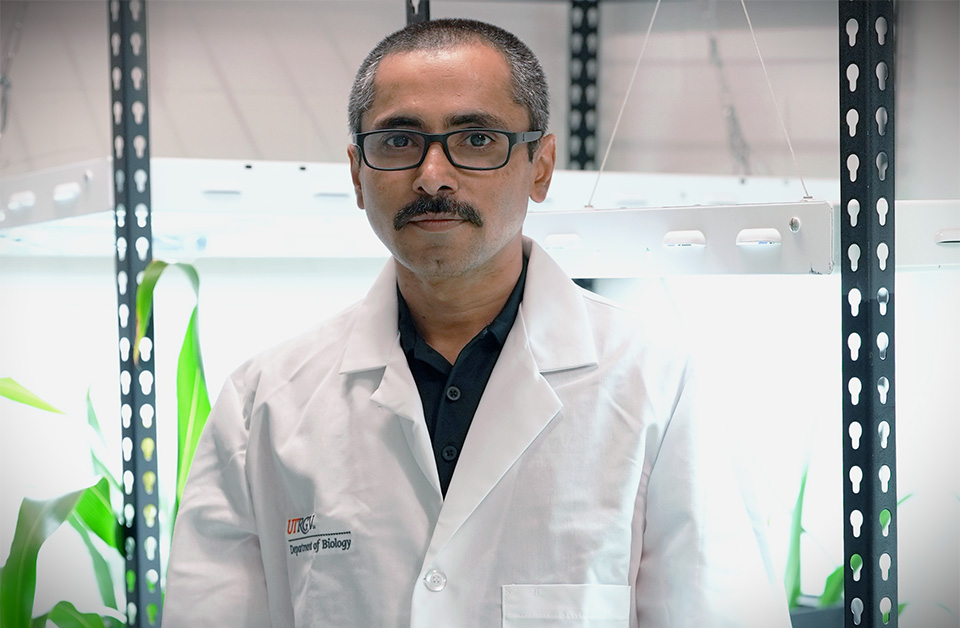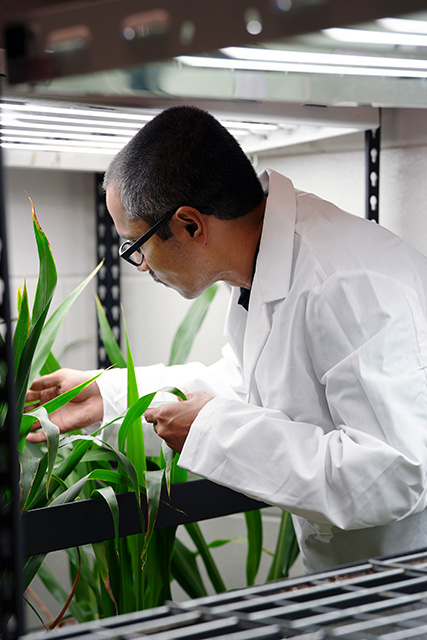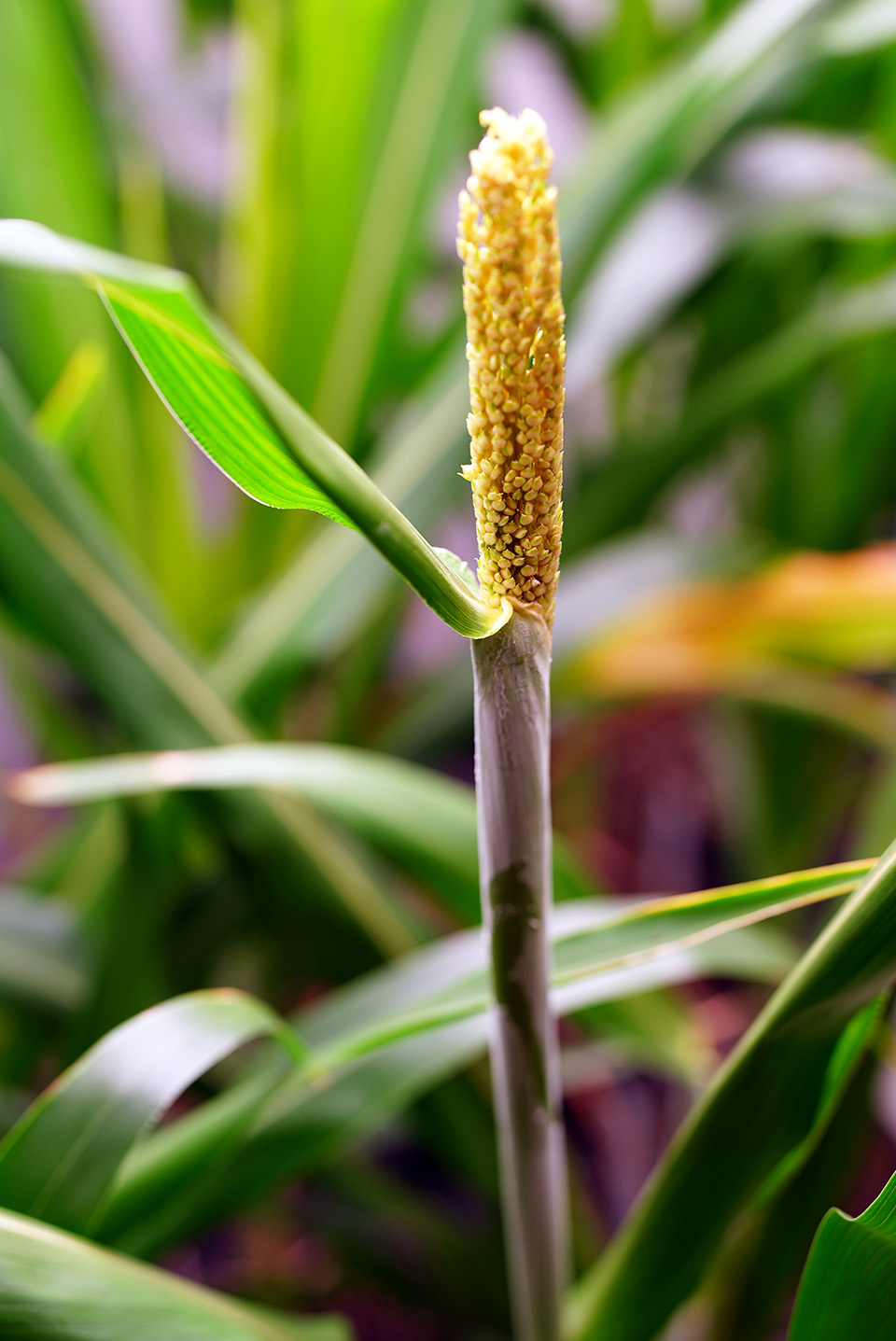
Dr. Manohar Chakrabarti, assistant professor of Plant Functional Genomics at UTRGV, will lead a research project focused on enhancing cereal crop resilience to abiotic stresses. (UTRGV Photos by Jesús Alférez)
News Release | Research

Dr. Manohar Chakrabarti, assistant professor of Plant Functional Genomics at UTRGV, will lead a research project focused on enhancing cereal crop resilience to abiotic stresses. (UTRGV Photos by Jesús Alférez)
Tuesday, February 6, 2024
Faculty Focus, Research
By Maria Gonzalez
RIO GRANDE VALLEY, TEXAS – FEB. 6, 2024 -- Dr. Manohar Chakrabarti, assistant professor of Plant Functional Genomics in the UTRGV School of Integrative Biological and Chemical Sciences (SIBCS), has been awarded a $503,000 grant from the National Science Foundation (NSF) to help develop climate-smart crops.
The funding will support his research in genetic and molecular mechanisms in plants to develop climate-smart crops that are resilient to abiotic stresses caused by extreme weather events such as droughts and heatwaves. The goal of his research, in part, is to enhance agricultural sustainability.
Chakrabarti, the grant’s principal investigator, said climate change is a pressing global concern, particularly because of its significant impact on agriculture. 
“My research aims to enhance the resilience of cereal crops against abiotic stresses and identify new targets for improving their stress tolerance,” he said.
He hopes to discover new mechanisms for regulating responses to abiotic stresses and develop crops that can thrive in changing environments.
SORGHUM: RESILIENT RESEARCH MODEL SYSTEM
Chakrabarti will use sorghum – a major cereal, feed and bioenergy crop – to identify new mechanisms that control responses to drought and heat.
“By unraveling the molecular mechanisms of abiotic stress adaptation in sorghum, we can use that information to engineer abiotic stress tolerance in other cereal crops that are more susceptible, such as corn, rice and wheat,” he said.
His research potentially could have an impact on climate change by creating new approaches to enhance stress tolerance in cereal crops, and by regulating their responses to those environmental challenges.
EDUCATION: A VITAL COMPONENT

“This project will also allow me to recruit high school, undergraduate and graduate students, along with a postdoctoral research scholar, who will receive extensive training in modern biotechnology and genomics research relevant to plant biology and agriculture,” he said.
Additionally, he plans to integrate his project results into course modules and develop new courses.
Chakrabarti, who joined UTRGV in fall 2022, is optimistic about future collaborations in plant science research.
“This past year was challenging but, scientifically, extremely remunerative. I established my lab, began student recruitment, published the first peer-reviewed publication from my lab, contributed to teaching, and engaged in community outreach.” he said. “I look forward to collaborating with fellow researchers at UTRGV and to developing an applied research program focused on crops important to the Valley.”
Dr. Can (John) Saygin, senior vice president for Research and dean of the Graduate College, said Chakrabarti is making significant contributions to climate-smart agriculture research.
“In his first year at UTRGV, Dr. Chakrabarti made significant advancements in plant biotechnology and genomics,” Saygin said. “He is poised to transform agriculture in the Rio Grande Valley, one of the state’s richest farming areas.”
ABOUT UTRGV
The University of Texas Rio Grande Valley (UTRGV) was created by the Texas Legislature in 2013 as the first major public university of the 21st century in Texas. This transformative initiative provided the opportunity to expand educational opportunities in the Rio Grande Valley, including a new School of Medicine and a School of Podiatry, and made it possible for residents of the region to benefit from the Permanent University Fund – a public endowment contributing support to the University of Texas System and other institutions.
UTRGV has campuses and off-campus research and teaching sites throughout the Rio Grande Valley including Brownsville (formerly The University of Texas at Brownsville campus), Edinburg (formerly The University of Texas-Pan American campus), Harlingen, Weslaco, McAllen, Port Isabel, Rio Grande City and South Padre Island. UTRGV, a comprehensive academic institution, enrolled its first class in the fall of 2015; the School of Medicine welcomed its first class in the summer of 2016, and the School of Podiatric Medicine in the fall of 2022.